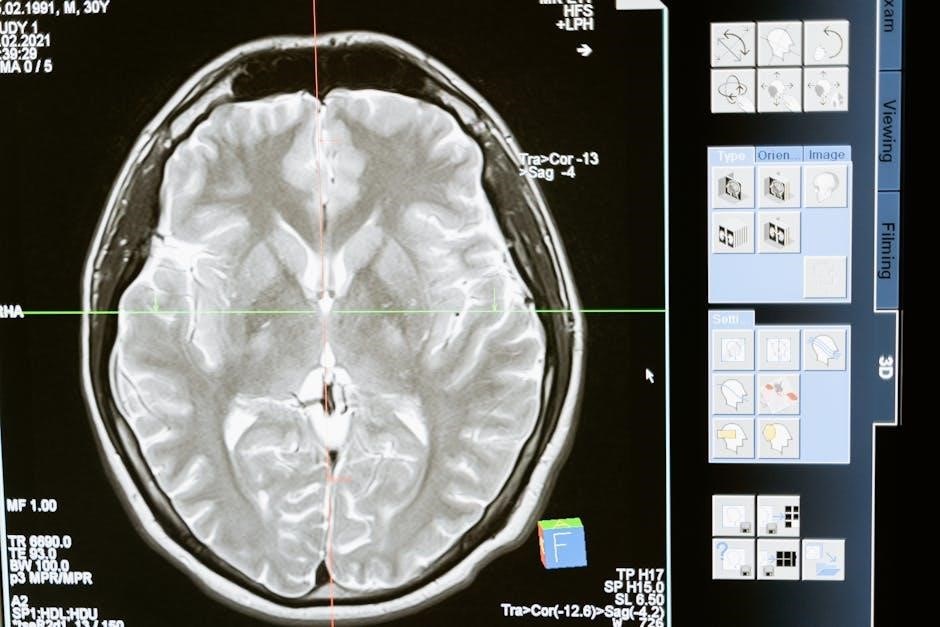An Algebra Readiness Test is a diagnostic tool assessing a student’s preparedness for algebraic concepts․ It evaluates numerical skills‚ problem-solving abilities‚ and pre-algebra knowledge to identify strengths and areas needing improvement․
1․1 Understanding the Purpose of Algebra Readiness Tests
Algebra Readiness Tests are designed to evaluate a student’s readiness for algebra by assessing essential math skills․ They identify gaps in numerical understanding‚ problem-solving‚ and pre-algebra concepts․ These tests help educators and parents determine if a student is prepared for advanced math courses‚ ensuring proper placement and a strong foundation for future success․
1․2 Importance of Assessing Readiness for Algebra
Assessing readiness for algebra is crucial to ensure students have a solid foundation in pre-algebra concepts․ It helps identify learning gaps‚ allowing targeted support․ Proper assessment ensures students are adequately prepared for algebra‚ reducing the risk of struggles and fostering long-term academic success in mathematics․
Structure of an Algebra Readiness Test
An Algebra Readiness Test typically includes numerical skills‚ pre-algebra questions‚ and problem-solving tasks․ It assesses a student’s ability to handle basic algebraic concepts and operations effectively․
2․1 Key Components of the Test
The Algebra Readiness Test includes numerical skills‚ pre-algebra questions‚ and problem-solving tasks․ It assesses understanding of integers‚ operations‚ and basic algebraic expressions․ Students solve equations‚ interpret graphs‚ and complete word problems; The test evaluates conceptual grasp and application abilities‚ ensuring readiness for advanced algebraic studies; Multiple-choice and open-response questions are used to thoroughly assess readiness․
2․2 Types of Questions Included
The test features multiple-choice questions‚ open-response problems‚ and word-based scenarios․ It includes numerical computations‚ algebraic expressions‚ and graph interpretations․ Students solve equations‚ simplify expressions‚ and apply problem-solving strategies․ The questions are designed to evaluate both conceptual understanding and practical application of pre-algebra skills‚ ensuring a comprehensive assessment of readiness for algebra․
Preparing for the Algebra Readiness Test
Preparing involves reviewing essential math concepts‚ practicing problem-solving strategies‚ and using sample questions to build confidence․ Consistent review ensures readiness for algebraic challenges․
3․1 Reviewing Essential Math Concepts
Reviewing essential math concepts is crucial for Algebra readiness․ Focus on numerical skills‚ integers‚ fractions‚ and decimals․ Practice solving equations‚ graphing‚ and word problems․ Strengthen understanding of ratios‚ proportions‚ and basic algebraic expressions․ Regularly reviewing these areas ensures a solid foundation for more complex Algebra concepts ahead․
3․2 Effective Study Strategies
Effective study strategies involve regular practice with sample questions and focusing on weak areas․ Utilize online resources and practice tests to familiarize yourself with the test format․ Break study sessions into manageable parts‚ prioritizing numerical skills and problem-solving․ Seek additional support if needed‚ and review answer keys to understand mistakes․ Consistent effort ensures steady progress․
Sample Questions and Practice Resources
Sample questions cover numerical skills and pre-algebra concepts‚ mirroring actual test formats․ Practice resources‚ including PDF guides and online tests‚ are widely available for targeted preparation․
4․1 Numerical Skills and Pre-Algebra Questions
Numerical skills assess operations with integers‚ decimals‚ and fractions‚ while pre-algebra questions focus on solving linear equations and understanding variables․ Sample questions often include simplifying expressions like 2x + 3 = 7 or solving for variables in basic algebraic problems․ These questions evaluate foundational math concepts necessary for transitioning into algebraic studies effectively․
4․2 Where to Find Practice Tests
Practice tests for algebra readiness can be found on educational websites‚ school resources‚ and online platforms offering algebra prep materials․ Many schools provide sample tests or pdf guides to help students familiarize themselves with the format and content․ Additionally‚ websites like HSLDA Academy and Scholé Academy offer placement exams and readiness checks to assess student preparedness for algebra courses․

Administering the Test
Administering the Algebra Readiness Test involves creating a quiet‚ distraction-free environment․ Ensure all materials are available and adhere to the specified time limits for accurate assessment․
5․1 Guidelines for Test Administration
Administering an Algebra Readiness Test requires a quiet‚ distraction-free environment․ Provide clear instructions‚ ensuring students understand the test format․ Allow adequate time for completion and ensure all materials are available․ Monitor the test to prevent cheating and ensure no unauthorized aids are used․ Collect materials promptly after completion and store them securely for confidentiality․
5․2 Tools and Materials Needed
The test requires a printed or digital copy of the Algebra Readiness Test‚ pencils‚ erasers‚ and a calculator for specific sections․ Ensure access to a timer for time management․ Provide answer sheets if required․ Additional resources like formula sheets or review guides may be allowed‚ depending on test guidelines․ Ensure all materials are distributed evenly and collected securely after completion․
Interpreting Test Results
Understanding test results involves analyzing scores to assess algebra readiness․ Results highlight strengths and areas needing improvement‚ guiding decisions on algebra placement or additional preparation requirements․
6․1 Understanding Scoring Criteria
Scoring criteria for algebra readiness tests evaluate numerical skills‚ problem-solving‚ and pre-algebra concepts․ Tests are divided into sections‚ with raw scores calculated based on correct answers․ Some tests include penalty deductions for incorrect responses‚ while others award partial credit․ Percentiles or proficiency levels indicate readiness for Algebra 1‚ helping educators and parents determine if additional preparation is needed before advancing․
6․2 Determining Readiness for Algebra
Algebra readiness tests assess a student’s preparedness for Algebra 1 by evaluating their mastery of numerical skills and pre-algebra concepts․ Test results determine if a student meets the required criteria‚ indicating readiness for the next level or identifying areas needing improvement․ High scores may place students directly into Algebra 1‚ while others may require additional review before advancing․
Additional Resources and Support
Supplementary learning materials‚ such as online guides and practice worksheets‚ are available to reinforce algebra readiness․ Tutoring services and academic support programs can further assist students in building their skills effectively․
7․1 Supplementary Learning Materials
Supplementary learning materials‚ such as workbooks‚ online guides‚ and video tutorials‚ provide additional practice for algebra readiness․ These resources often include step-by-step explanations‚ example problems‚ and interactive exercises․ Many websites like Khan Academy and IXL offer free or paid resources tailored to algebra preparation․ Students can use these materials to reinforce weak areas identified through readiness tests‚ ensuring a stronger foundation before advancing to algebra courses․
7․2 Tutoring and Academic Support Options
Tutoring and academic support options‚ such as one-on-one sessions or small group tutoring‚ can help students address specific weaknesses․ Online platforms like Khan Academy and IXL provide interactive lessons and exercises․ Additionally‚ many schools offer algebra readiness workshops or after-school programs․ These resources help students build confidence and mastery of pre-algebra concepts‚ ensuring they are well-prepared for the challenges of algebra․
Placement Exams and Readiness Checks
Placement exams and readiness checks are essential tools to assess a student’s preparedness for algebra courses‚ ensuring they are placed appropriately and identifying areas needing improvement․
8․1 The Role of Placement Exams
Placement exams are crucial for determining a student’s readiness for algebra courses․ They assess numerical skills‚ problem-solving abilities‚ and pre-algebra knowledge‚ ensuring proper placement and identifying areas needing additional support․ These exams help tailor learning environments and ensure students are adequately prepared for the challenges of algebra‚ providing a clear path for academic success․
8․2 Readiness Checks for Algebra 1
Readiness checks for Algebra 1 are assessments designed to evaluate a student’s mastery of pre-algebra concepts and numerical skills․ These checks identify gaps in knowledge and determine if a student is prepared for the challenges of Algebra 1․ They often include solving equations‚ graphing‚ and applying mathematical reasoning‚ ensuring a smooth transition to higher-level math courses․

Answer Keys and Solutions
Answer keys provide correct solutions for practice tests‚ helping students and educators identify mistakes and improve understanding․ They are essential for accurate self-assessment and targeted learning․
9․1 Accessing Official Answer Keys
Official answer keys for algebra readiness tests are often available on the publisher’s website or educational platforms․ They provide correct solutions‚ enabling students to verify answers and understand mistakes․ Many are offered as free downloadable PDFs․ Search for “algebra readiness test answer key” or “algebra readiness test PDF solutions” to find reliable sources․ Always ensure the credibility of the provider for accurate results․
9․2 Reviewing Correct and Incorrect Answers
Reviewing correct and incorrect answers helps students understand their strengths and weaknesses․ Correct answers reinforce understanding‚ while incorrect ones highlight areas needing improvement․ Use official answer keys to identify mistakes‚ analyze error patterns‚ and focus on weak topics․ Restudy concepts‚ practice similar problems‚ and seek additional resources or tutoring to address gaps in knowledge effectively․

Common Challenges and Solutions
Students often struggle with problem-solving strategies and retaining pre-algebra concepts․ Address these challenges by reviewing foundational math skills‚ practicing regularly‚ and using supplementary resources to reinforce learning․
10․1 Identifying Weak Areas
Algebra readiness tests help pinpoint areas where students need improvement‚ such as numerical skills or problem-solving strategies․ Common challenges include mastering fractions‚ integers‚ and pre-algebra concepts․ By analyzing test results‚ educators can identify gaps in understanding and provide targeted support to address these weaknesses effectively․
10․2 Strategies to Overcome Difficulties
To address weaknesses‚ students should practice regularly‚ focusing on problem areas like fractions or integers․ Using visual aids‚ such as graphs or algebra tiles‚ can enhance understanding․ Breaking problems into smaller steps and seeking guidance from tutors or educators can also build confidence and improve skills effectively․

The Role of Parents and Educators
Parents and educators play a crucial role by providing resources‚ guiding study habits‚ and encouraging a positive attitude toward algebra‚ fostering a supportive learning environment․
11․1 Supporting Students in Test Preparation
Parents and educators can support students by creating personalized study plans‚ encouraging regular practice with sample questions‚ and providing feedback․ Utilizing algebra readiness test PDFs and online resources helps familiarize students with test formats․ Guiding them to focus on weak areas and fostering a growth mindset builds confidence and readiness for algebra․
11․2 Encouraging a Positive Attitude Toward Algebra
Encouraging a positive attitude toward algebra involves celebrating small successes and connecting the subject to real-life applications․ Parents and educators should emphasize effort over difficulty‚ fostering resilience․ Providing engaging resources‚ such as algebra readiness test PDFs with sample questions‚ can make learning interactive and fun․ Positive reinforcement and hands-on activities help students view algebra as achievable and meaningful․
Algebra readiness tests PDFs provide valuable insights‚ guiding students toward algebra success․ Utilize these resources to identify strengths‚ address weaknesses‚ and confidently progress in math education․
12․1 Summary of Key Takeaways
An algebra readiness test PDF is a diagnostic tool assessing numerical skills‚ problem-solving abilities‚ and pre-algebra knowledge․ It identifies strengths and areas needing improvement‚ ensuring students are prepared for algebra․ Effective study strategies‚ practice resources‚ and placement exams help determine readiness․ Supplementary materials and tutoring support further aid in building confidence․ Parents and educators play a crucial role in encouraging a positive attitude toward algebra‚ fostering long-term math success․
12․2 Moving Forward After the Readiness Test
After completing an algebra readiness test PDF‚ students can use the results to guide their next steps․ Those ready for Algebra 1 can enroll confidently‚ while others may benefit from additional review or tutoring․ Accessing practice resources and answer keys helps reinforce concepts․ Educators and parents should encourage a growth mindset‚ ensuring students feel supported in their mathematical journey․